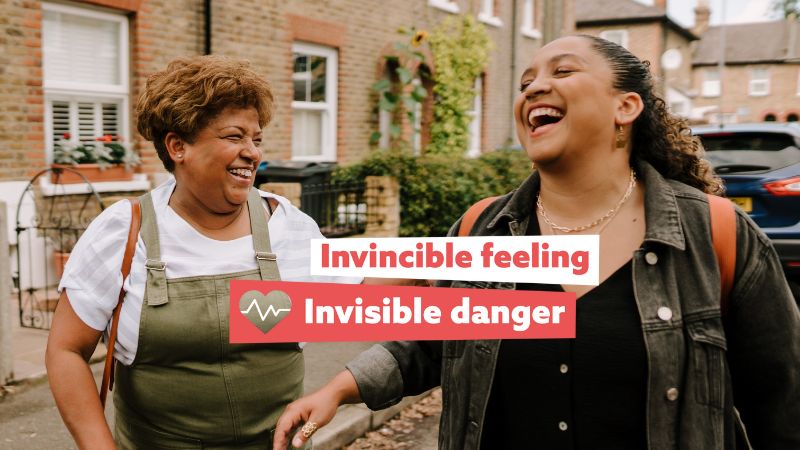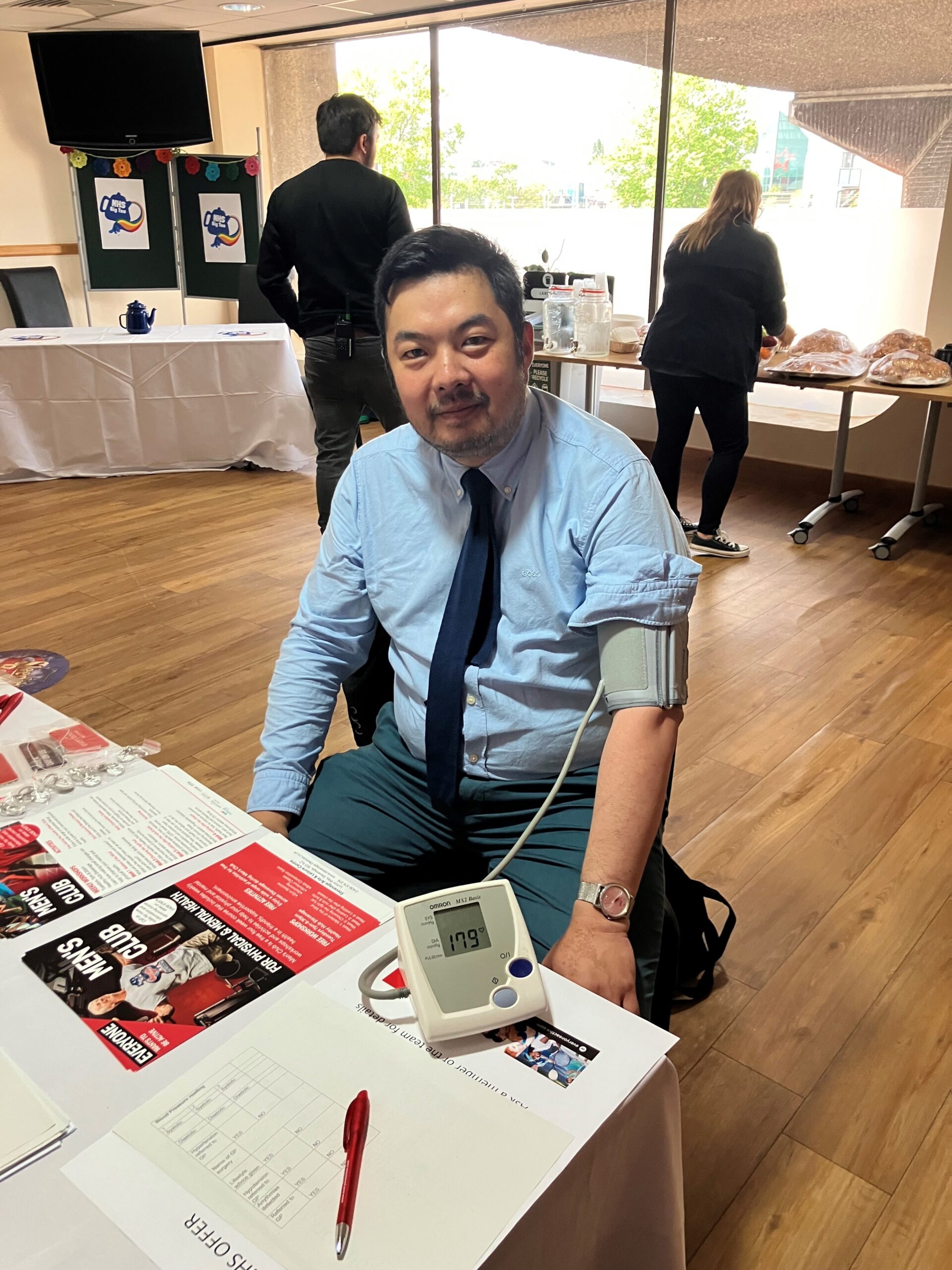
On this page
What is blood pressure and how can it impact your health?
One in four adults have high blood pressure, but only half know they have it. Having high blood pressure (hypertension) increases your risk of heart attack and stroke, and also of conditions such as kidney disease and heart failure.
Often high blood pressure has no symptoms. This is why it is important to get your blood pressure checked.

If you find out you have high blood pressure, there is a lot you can do to lower it to a healthy level. This might involve making some simple changes to your lifestyle or, sometimes, taking medicines prescribed by your doctor.
Sometimes high blood pressure does cause some symptoms like blurred vision, headaches and nosebleeds. If you are experiencing these symptoms and think you might have high blood pressure, please see your GP.
Where can you get a blood pressure check?
- At a pharmacy. More than 200 pharmacies in Hertfordshire and West Essex offer blood pressure checks. Checks are free for people over 40 who have not had a blood pressure check in the past 6 months. Find a participating pharmacy near you.
- At your GP
- As part of your NHS Health Check
- Using a self-service blood pressure machine while waiting for your appointment at a hospital or clinic
- Using a blood pressure monitor at home.
All adults over 40 are advised to get their blood pressure checked at least every 5 years. Some people from African, Afro-Caribbean or South Asian heritage may have high blood pressure at a younger age and are encouraged to get their blood pressure checked earlier.
The more that we can do to raise awareness of the risks associated with high blood pressure, the more chance we have of reducing the number of people suffering the consequences.
“It’s not all doom and gloom if you discover you have high blood pressure. Many of the causes are reversible, such as not being physically active, being overweight or obese, having too much salt in your diet, smoking or regularly drinking too much alcohol. So take the time to get your blood pressure checked today.”
Dr Rachel Joyce, Medical Director
How to take your own blood pressure
If you have a blood pressure monitor at home, checking your own blood pressure is simple. When you’re taking your blood pressure at home, there are things you can do to help get an accurate reading.
Measuring your blood pressure at home while you go about your everyday life can help to give you and your doctor/nurse a more accurate picture of your blood pressure over time.
Everyone’s blood pressure naturally rises and falls over the course of a day and some people can be stressed or anxious when having their blood pressure taken by their doctor or nurse, making their blood pressure higher than it normally is (known as the ‘white coat effect’). This means that a ‘one-off’ reading taken at your doctor’s surgery or the hospital may not accurately reflect your real blood pressure.
Home blood pressure readings can avoid these problems and can help doctors and nurses to:
- establish whether you have high blood pressure
- decide if blood pressure medication is required
- decide whether any changes to blood pressure medication are required
- see how well your blood pressure medication is controlling your blood pressure
- further investigate people whose blood pressure is hard to control.
Monitoring your blood pressure at home can also help you to see how the medication you are taking is working and gain a better understanding of your condition.
Try to:
- sit on an upright chair with a back
- place your feet flat on the floor
- rest your arm on a table and relax your hand and arm
- wear something with short sleeves so the cuff does not go over clothes
- relax, breathe normally and do not talk during the test
- take another reading a few minutes after your first reading to check it’s accurate
What is a healthy blood pressure?

If your blood pressure reading is healthy, you should have a check at least every five years, or sooner if you feel unwell. If you’re overweight, smoke or are over 65 you should check your blood pressure more frequently.

If your blood pressure reading is high, check again and use the average of the two readings. If it is still above 140/90, go to a pharmacy or arrange an appointment with your GP within 2-3 weeks. If you start to feel unwell in those 2-3 weeks with any of the following symptoms, contact NHS 111: headache, dizziness, blurred vision, shortness of breath. If you are aged 80 and over, your blood pressure is considered to be high if it is over 150/90.

If your blood pressure is very high, please take two more readings, waiting 5 minutes between each reading. Use the average of the three readings. If your blood pressure is persistently above 180/120, this requires urgent medical attention and you should go to A&E as soon as you can the same day.
You can use this NHS tool to understand your blood pressure readingHow to reduce your blood pressure

What works best to manage high blood pressure is different for each person. The best way to reduce high blood pressure is with some lifestyle changes.
Hertfordshire: For help with improving your lifestyle visit one of the Herts Healthy Hubs Essex: For help with improving your lifestyle visit the Essex Wellbeing Service.Doctors can help you keep your blood pressure to a safe level using lifestyle changes or in some cases some medicines. Talk to your doctor to help you decide about treatment.
Ways to keep your blood pressure healthy
- Regular physical activity – try to do some moderate-intensity activity every day (exercise that makes you breathe faster and gets you warm). Build up to at least 150 minutes activity per week, in bouts of 30 minutes or more. Also try to avoid sitting too much. Exercise guidelines and workouts to help improve your fitness and wellbeing.
- Keep to a healthy weight – for some people, losing weight is all they need to do to get their blood pressure down to a normal level. Here are some NHS tips to help you lose weight.
- Eat a healthy balanced diet – use the Eatwell plate to guide the proportions you include from each food group. Make sure to include a variety of fruit and vegetables. Try to eat at least 5 portions of fruit and vegetables a day. . Also try to cut back on caffeine, drinking more than 4 cups of coffee a day may increase your blood pressure.
- Eat less salt – an adult should eat less than 6g of salt a day. The BHF recommends you don’t cook with salt or add any to your food. Try to cut down on processed foods, which contain a lot of salt- check food labels for salt content.
- Be careful with alcohol – regularly drinking too much alcohol can raise your blood pressure over time and it is high in calories which can make you gain weight and further increase your blood pressure. If you drink alcohol, stick to the recommended limit. No more than 14 units a week on a regular basis. If you drink as much as 14 units a week, it’s best to spread your drinking over 3 or more days.
- Take your medicines – most people need to take medicine to control their blood pressure. Blood pressure tablets are very effective and can reduce the risk of heart attack and stroke. Don’t stop your medication without speaking to your GP first.
- Stop smoking – to reduce your risk of heart attack and stroke. There is lots of support to help you quit for good.
Get help locally
Healthy Hub – Healthy Hubs in Hertfordshire offer free health and wellbeing information, helping local people and communities to stay well. They are run by local councils.
Essex wellbeing service – Whether it’s help to quit smoking, social isolation support, weight management, or help with day-to-day needs; the Essex Wellbeing Service is here to help employers, families and communities to stay healthy, safe and well.
Hertfordshire Health Walks – free health walks near you, whatever your fitness level.
Active Essex – Find an activity that’s right for you – and just give it a go!
Moving more – helping Hertfordshire residents be more physically active. Find activities near you.
Hertfordshire stop smoking service – local support to help you cut down or quit smoking
Essex stop smoking service – local support to help you cut down or quit smoking
Patient stories


In the summer of 2021, while feeling totally fit and well, I suffered a stroke as a result of high blood pressure. I had never even considered that I may need to get my blood pressure checked. Fortunately I made an excellent recovery. It is important to get blood pressure checked as a preventative measure. medication can so easily prevent a catastrophic stroke.
Anne, from Tewin in Hertfordshire
Posters and other materials to support our campaign“My blood pressure was measured at an event last summer and was slightly high. I started to get headaches during the winter and put two and two together and had it checked again. It had gone up into the range where it needed treatment. My advice would be – just find out if you have high blood pressure and deal with it, through improving your lifestyle changes and if necessary taking drugs. You might, like me, find you actually have slightly more time because you feel more energetic.”
Dr Mark Lim, Associate Medical Director, Hertfordshire and West Essex ICB